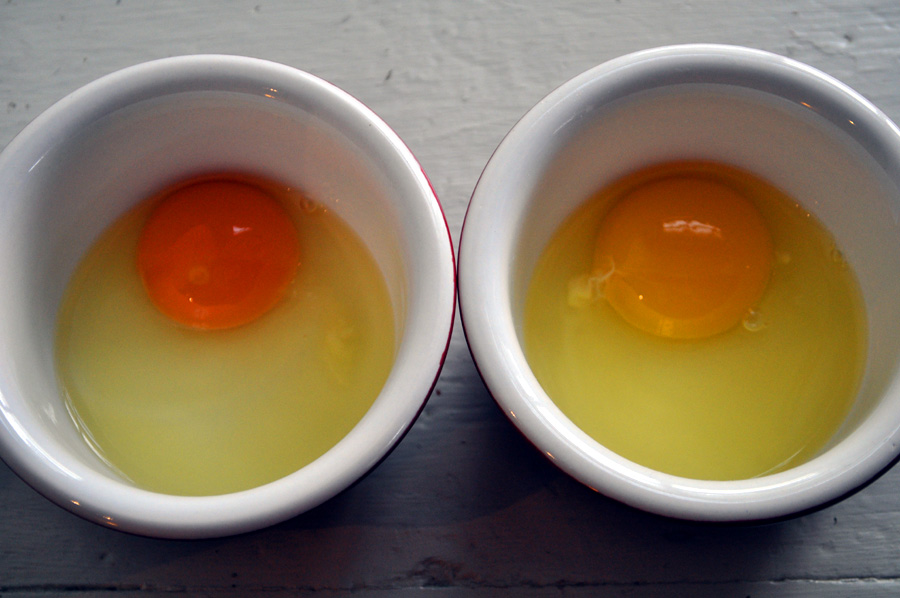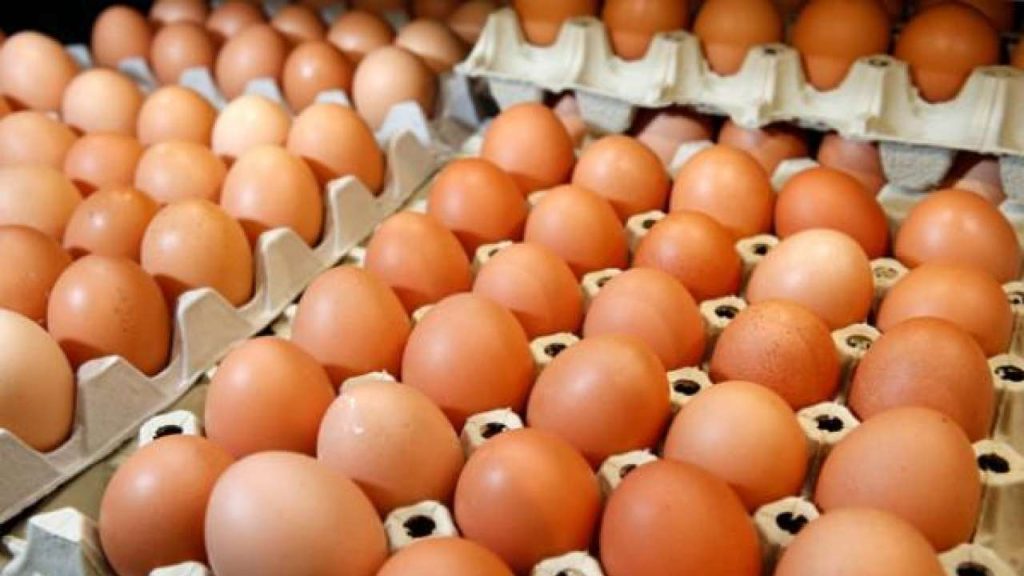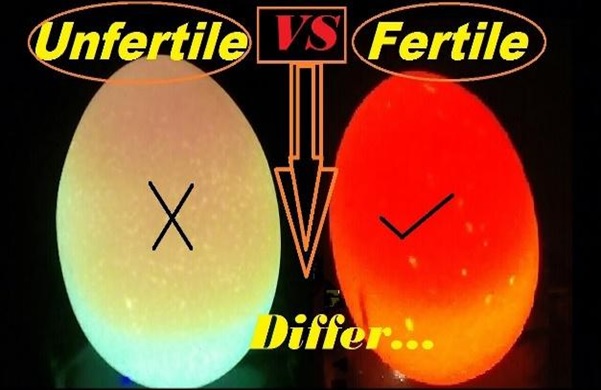Are Grocery Store Eggs Fertilized? How Do They Differ From Unfertilized Eggs?

I’ve purchased eggs from a farm, but I usually purchase them from a supermarket. So, I’m curious if grocery store eggs are fertilized.
Here’s what I’ve discovered so far:
No. Most eggs sold in supermarkets are unfertilized, which means the chickens did not mate with a rooster before laying the eggs. Even eggs purchased in supermarkets may not hatch if stored too cold or packed more than two weeks ago.
However, there is much more to learn about fertilized eggs!
So, in this article, we’ll go over the specifics! The differences between fertilized and unfertilized eggs will be discussed. However, we’ll look at how to identify if an egg has been fertilized as well as the advantages of fertilized eggs.
Finally, we’ll address some of the most often asked questions concerning supermarkets and fertilized eggs.
Let’s get this party started!
How do fertilized and unfertilized eggs differ?

Fertilized eggs are hens’ eggs that have been fertilized by mating with a rooster. If a hen hasn’t mated in a while and lays eggs, the eggs will not be fertilized. Chickens, as we all know, lay eggs.
In theory, only female chickens referred to as hens lay eggs. Now, until science intervenes, it needs a man and a woman to conceive a child in humans. On the other hand, chickens can lay eggs whether or not a rooster is present.
In general, viable eggs are laid within a week following the rooster mating with the hen.
So, are all fertilized eggs going to hatch?

It is debatable. To begin, it’s far more challenging to hatch eggs that have been kept in the refrigerator. If you wish to attempt it (many people have), bring the viable eggs from Trader Joe to room temperature before putting them in the incubator.
Eggs must typically be incubated within seven days of being laid and kept in the incubator for 21 days before hatching.
Has it always been the case that most grocery store eggs are unfertilized?

The short answer is no. Most of our forefathers ate fertilized eggs 100 years ago, before the advent of transportation, factory farms, and massive chain grocery shops. Most farmers got rid of the roosters after vehicles replaced wagons and larger stores popped up, as well as the demand for eggs to be carried from one site to another.
Why?
Because roosters need to be fed and taken care of, they don’t improve the quality of the eggs. Fertilization does not result in larger, more nutritious eggs or increase the number of eggs laid by hens. In brief, roosters were viewed as an unnecessary expense that did not profit the farmer. Thus most farmers eliminated them from the egg business.
Is it true that the eggs we eat have been fertilized?

No. The majority of eggs consumed by consumers are unfertilized. The majority of us purchase our eggs from a supermarket chain. These businesses, in turn, frequently purchase eggs from some of the country’s largest egg suppliers.
The chickens laying the hundreds of thousands of eggs each week are not kept among roosters since those egg companies are similar to enormous factory farms.
As a result, they don’t mate, and the eggs they lay aren’t fertilized.
The following are some of the world’s largest egg producers:
- Cal-Maine Foods (brands include Eggland’s Best, Farmhouse, 4Grain, and Land of Lakes). Rose Acre Farms, Inc.
- Michael Foods Inc. (Papetti’s, Abbotsford Farms, and Davidson’s) is an egg branded Company owned by Hillandale.
However, most supermarkets, particularly Whole Foods, will stock some brands of fertilized eggs. These brands will cost more and be plainly labeled as fertilized eggs.
They’re more expensive because they’re usually tiny farms than the mega-corporations I mentioned earlier. Because they are a tiny business, they have limited resources and revenues. As a result, they are usually more expensive.
The following are some of the most well-known brands of fertilized eggs:
- Fertilized eggs from Trader Joe’s
- Eggs from the Rock Islands
Is it possible to hatch a store egg?
Yes, fertilized eggs from the supermarket can sometimes be hatched if they haven’t been kept too cold and aren’t more than two weeks old. However, hatching eggs from a hatching company or a local farm is easier.
For starters, eggs at the shop were most likely kept cold (despite not being officially required for food safety). And any embryo within the shell would have died if the retailer (or delivery truck or warehouse) kept them too cold.
The cold hinders your ability to hatch an egg (but is not wholly prevented). Before putting them in the incubator, make sure they’re at room temperature.
For another thing, they’re probably too old. The capacity to hatch eggs decreases dramatically after they reach the 2-week mark. If the fertile eggs you’re using have a pack date, that’s an excellent way to assess if they’re new enough to try hatching. On the other hand, some egg brands use the Julian calendar (to complicate things).
Julian dating informs you of the date on which they were packed. So the first of the year is 001, and the last day of the year is 365. So you’ll need to do some arithmetic to figure it out.
Is it possible for an unfertilized egg to hatch?

Almost all stored eggs are not fertilized is the fundamental reason they cannot be hatched. There will be no baby if the rooster does not mate with the hen. As a result, a chicken cannot develop inside the eggshell biologically. They are not fertile eggs and will not hatch unless the carton is labeled “fertile” or “fertilized.”
Farmers use various methods to determine whether a chicken egg has been fertilized.
Farmers must know when the roosters mate with the hens to know if an egg is fertilized. They accomplish this by separating the roosters from the hens. When it’s time to mate, the hen and rooster are mingled, and the hen and rooster mate, producing fertile eggs.
After mating with a rooster, hens lay viable eggs for roughly a week.
Within a week, any eggs laid will most likely be viable.
By lighting a candle to them, farmers can also detect the difference between fertilized and unfertilized eggs. Candling is the process of holding an egg up to a candle flame to see the embryo. You may notice blood spots as well.
The shells of viable eggs will also be more opaque or translucent under candlelight.
Of course, you can buy unique lights to simulate candlelight for this purpose in modern times. However, there’s no reason why you couldn’t use a candle instead. It’s not an exact science, like everything else in nature. As a result, it is conceivable to purchase a reportedly fertile egg and be unable to hatch it.
Is it true that white eggs are unfertilized?

Because egg color is controlled by the breed of chicken rather than whether the hen has mated with a rooster, white eggs can be fertilized or unfertilized. There’s no link between egg color and whether or not an egg is fertilized, whether it’s brown, white, or another hue. Egg color, for that matter, has no bearing on nutrition or flavor.
It’s only a matter of personal taste.
Is it true that fertilized eggs are more nutritious?
No. Fertilized eggs offer no nutritional advantage over unfertilized eggs.
“Eating fertilized eggs has no benefit,” according to the USDA’s Food Safety and Inspection website. Fertilized eggs and infertile eggs have the same nutritional value.”
So why do some individuals eat them if there is no difference?
What a great question! I believe there is an increasing movement to eat more naturally these days and during the past few decades. As a result, many people are looking for food that contains fewer additives, preservatives, and artificial components.
That’s what made Whole Foods possible, and it’s why they’re so successful.
People want to eat more than before; the current push for convenience transformed how we prepare, purchase, and consume food. On the other hand, fertilized eggs are a natural fit for that mindset.
However, there is no scientific proof that ingesting fertilized eggs has benefits.
Is there a difference in flavor between fertilized and unfertilized eggs?

No. Even if you ate a viable egg raw, you wouldn’t be able to tell the difference in flavor between it and a non-fertile egg in a blind taste test. The natural foods movement of the 1970s and 1980s was responsible for the idea of eating viable eggs, as I said before.
There was a great movement back then to get back to raising, processing, and eating food the way our forefathers did before modern conveniences took over. Fertilized and unfertilized eggs, on the other hand, have no flavor or nutritional differences.
Is it possible to fertilize free-range eggs?
Fertilization is optional for free-range eggs. This is because hens permitted to roam freely, particularly if roosters are also allowed to roam freely, cannot be tracked in terms of when or whether they mate.
Instead of being held in cages, free-range hens can move around a bit more freely. So, whether or not the eggs are fertile has nothing to do with whether or not they were raised free-range.
After animal rights organizations exposed the frequently terrible circumstances seen in factory farms, the free-range movement was born. To make life simpler for the workers and maximize earnings, hundreds of thousands of chickens were crammed into tiny cages and snipped their beaks.
The countryside isn’t the only place where free-range hens may be found.
They can’t just be placed in a pen since predators like raccoons and foxes will eat them. However, they are not kept in tight cages and have some freedom to roam. Without a doubt, some egg brands are both free-range and viable. The two, however, have nothing to do with one another.
Is it true that organic eggs are fertilized?
Organic eggs and organically grown feed may or may not be fertile. Whether or not chickens were permitted to mate to produce fertilized eggs has nothing to do with each other. Organic indicates that the birds are fed organically farmed and certified feed. There are also organic regulations that prohibit the use of hormones or antibiotics in hens (or the feed).
So, while there may be organic and fertile eggs, the two have nothing to do with each other.
Did I answer all of your questions concerning fertilized eggs and whether or not the ones you buy at the store are fertilized?
We looked into the world of fertilized eggs in depth in this essay.
We looked into the advantages and disadvantages of fertilized and unfertilized eggs. However, we also responded to inquiries such as “Are organic eggs fertilized?”
Finally, we got to the bottom of the critical question: are grocery store eggs fertilized?
Fertilized or unfertilized eggs, which do you prefer?











